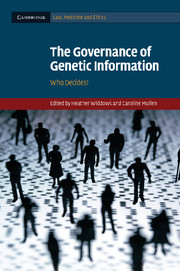Book contents
- Frontmatter
- Contents
- Notes on contributors
- Preface
- Introduction
- SECTION I Problematising governance of genetic information
- SECTION II Ethical frameworks of governance
- 4 Constructing communal models of governance: collectives of individuals or distinct ethical loci?
- 5 Rights, responsibility and stewardship: beyond consent
- 6 Who decides what? Relational ethics, genetics and well-being
- SECTION III Redesigning governance
- Bibliography
- Index
6 - Who decides what? Relational ethics, genetics and well-being
Published online by Cambridge University Press: 02 February 2010
- Frontmatter
- Contents
- Notes on contributors
- Preface
- Introduction
- SECTION I Problematising governance of genetic information
- SECTION II Ethical frameworks of governance
- 4 Constructing communal models of governance: collectives of individuals or distinct ethical loci?
- 5 Rights, responsibility and stewardship: beyond consent
- 6 Who decides what? Relational ethics, genetics and well-being
- SECTION III Redesigning governance
- Bibliography
- Index
Summary
This chapter addresses issues relating to genetic information and genetic technologies by asking what principles should guide the framework for the development of appropriate governance mechanisms. The chapter considers individualist and communitarian accounts, and addresses both specific technologies and broad theoretical frameworks. Genetic information is considered in the context of health related genetic technologies, as being the ‘end point’ of genetic research, where the development of genetic technologies and interventions requires the collection of genetic samples, the extraction of and collection of genetic information, and the storage of such information.
There is evidence of an emerging (or converging) rhetoric of community and social solidarity in policy and politics, and in academic commentary. Discussions of genetic information and technologies are both reflecting and developing this rhetoric, in highlighting the concepts of the shared nature of genetic information and of the human genome as the common heritage of mankind, and using notions of public goods and of benefit sharing. The implication of this ‘relational turn’ for the governance of genetic technologies is itself problematic in that it has tended to manifest either as a privileging of the collective over the individual, or by extending individualist concepts outwards to the family or the community. The philosophical frameworks which may underpin these accounts remain largely unspecified and unexplored. This chapter explores the application of one such framework to the governance of genetic information and technologies, as contemporary moral and political philosophy also reflects a turn towards more relational accounts of central philosophical concepts.
- Type
- Chapter
- Information
- The Governance of Genetic InformationWho Decides?, pp. 126 - 148Publisher: Cambridge University PressPrint publication year: 2009

